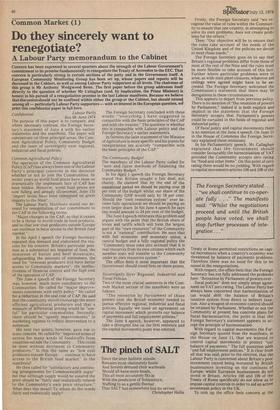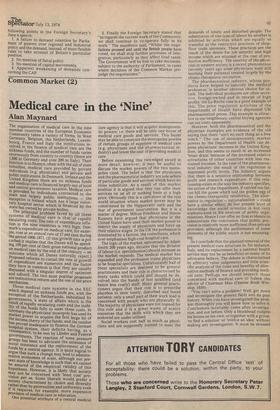Common Market (1)
Do they sincerely want to renegotiate?
A Labour Party memorandum to the Cabinet
Concern has been expressed in several quarters about the strength of the Labour Government's commitment to its promise fundamentally to renegotiate the Treaty of Accession to the EEC. That concern is particularly strong in certain sections of the party and in the Government itself. A European Community Monitoring Group has been set up, whose papers and reports will be discussed in the Cabinet, as well as among Labour Party supporters at all levels. The chairman of this group is Mr Anthony Wedgwood Rena. The first paper before the group addresses itself directly to the question of whether Mr Callaghan (and, by implication, the Prime Minister) is honest in his pursuit of a renegotiation promise in the last Labour manifesto. Because we believe that discussion should not be confined within either the group or the Cabinet, but should extend among all — particularly Labour Party supporters — with an interest in the European question, w4 print this confidential paper in full here.
Confidential Labour Party Res 88/June 1974 The purpose of this paper is to compare, and where necessary contrast, the Foreign Secretary's statement of June 4 with his earlier statements and the manifesto. The paper will concentrate on three principal areas: the Common Agricultural Policy, Community Budget and the issue of sovereignty over regional, industrial and fiscal policies.
Common Agricultural Policy .
The operation of the Common Agricultural Policy (CAP) has always been one of the Labour Party's principal concerns in the decision whether or not to join the Communities. In recent years as world food prices have risen so dramatically the unpleasant face of CAP has been hidden. However, world food prices are now falling and already (Economist, June 15) "import levies have been reimposed on grain imports to the Nine". The Labour Party Manifesto stated our demand for renegotiation of our commitment to the CAP in the following terms: "Major changes in the CAP, so that it ceases to be a threat to world trade in food products, and so that low-cost producers outside Europe can continue to have access to the British food market."
In his April 1 speech the Foreign Secretary repeated this demand and elaborated the reasons for his concern: Britain's particular position as a substantial net importer of food, the nonsense of butter and beef mountains, safeguarding the interests of consumers, the need for "overseas producers (to) have better access to Community markets", the ineffectiveness of financial control and the high cost of the operation of CAP.
The June 4 speech of the Foreign Secretary was, however, much more conciliatory to the Communities. He called for "major improvements consistent with party policy." He called for a reduction in the real cost of CAP. He said that the community should encourage the more efficient agricultural producers and that a measure of differential pricing would be "useful" for particular commodities. -Secondly, there should be ,"speedy improvements" in marketing regimes to reduce intervention to a minimum.
His next two points, however, gave rise to some concern. He called for "improved terms of access for many kinds of foodstuffs from countries outside the Community. ... This could be done without detriment to Community producers." Is this the same as "low cost producers outside Europe ... continue to have access to the British food market" in the manifesto?
He then called for "satisfactory and continuing arrangements for Commonwealth sugar" but that although supply would be assured the price should be "fairly and realistically related to the Community's own price structure." What does this mean? To whom do the words fairly and realistically apply? The Foreign Secretary concluded with these words: "everything I have suggested is compatible with the basic principles of the CAP and with the treaties." The question is whether this is compatible with Labour policy and the Foreign Secretary's earlier statements.
In fairness the later statement of the Minister of Agriculture is more specific and his points for renegotiation are scarcely "compatible with the basic principles of the CAP."
The Community Budget The manifesto of the Labour Party called for "new and fairer methods of financing the Community Budget."
In his April 1 speech the Foreign Secretary stated that Britain sought a fair deal, not charity. He claimed that by the end of the transitional period we should be paying over 19 per cent of the budget whilst our share of the Community GNP would only by 16 per cent. Should the "own resources system" ever become fully operational we should be paying an even larger share. In his June 4 speech he says this would amount to 24 per cent of the budget.
The June 4 speech reiterates this problem and argues with the point that the British share of levies and tariffs which will form the largest part of the "own resources" of the Community is not a "national" contribution. He says that with full economic and monetary union, a central budget and a fully regional policy the "Community must take into account that it is real resources from its own citizens which each member state will transfer to the Community under its own resources system."
The office feels it most important that the Government should stand firm on these points.
Sovereignty Over Regional, Industrial and Fiscal Policies
Two of the most crucial sentences in the Cornmo'n Market section of the manifesto were as follows:
"The retention by Parliament of those powers over the British economy needed to pursue effective regional, industrial and fiscal policies. Equally we need an agreement on capital movement which protects our balance of payments and full employment policies."
The June 4 speech, however, appeared to take a divergent line on the first sentence and the capital movements point was omitted. Firstly, the Foreign Secretary said "we recognise the value of rules within the Community to ensure that one country, in attempting to solve its own problems, does not create problems for the others."
Then: "Our objective will be to ensure that the rules take account of the needs of the United Kingdom and of the policies we devise to meet those needs."
The Foreign Secretary goes on to say that Britain's regional problems differ from those of most of the rest of the Nine and the rules must be more flexible to take account of this fact. Furtherwhere particular problems were to arise, as with steel plant closures, whatever aid ceilings were agreed might have to be exceeded. The Foreign Secretary welcomed the ,Commission's statement that there may be derogations in these circumstances. This appears to depart from previous policy. There is no mention of "the retention of powers by Parliament," indeed it is both explicit and implicit in the statement that the Foreign Secretary accepts that Parliament's powers could be curtailed in the fields of regional and industrial policy.
Of fiscal policy and capital Movements there is no mention in the June 4 speech. On June 11 in the House of Commons the Foreign Secretary explained these omissions.
In his Parliamentary speech, Mr Callaghan explained that the Government should consider favonrably the harmonisation of VAT provided the Community accepts zero rating for "food and other items". On this point of zero rating there would be no yielding. With regard to capital movements articles 108 and 109 of the Treaty of Rome permitted restrictions on capital movements when a country's economy was threatened by balance of payments problems. Thereforethere was no need for this to be raised in the renegotiations.
With respect, the office feels that the Foreign Secretary has not fully addressed the problems here. "Retention by Parliament of powers over.
• . fiscal policies" does not simply mean agreement on VAT zero rating. The Labour Party has always been concerned that harmonisation of tax would shift the balance of Britain's taxation system from direct to indirect taxation. Also a weapon of economic control should be retained by Parliament. Whether or not the Community at present has concrete plans for fiscal harmonisation, the point is that the Foreign Secretary's statement appears to accept the principle of harmonisation.
With regard to capital movements the Foreign Secretary quoted from the manifesto, in the House on June 11, that we wanted to control capital movements to protect "our balance of payments." The full quotation adds "and full employment policies." It is clear from all that was said, prior to the election, that the Labour Party is concerned about Britain's poor investment record being worsened by British businessmen investing on the continent of Europe, whilst European businessmen do not invest in Britain. Articles 108 and 109 of the Treaty of Rome specifically do not allow us to impose capital controls in order to aid an active investment policy in the UK.
To sum up the office feels concern at the following points in the Foreign Secretary's June 4 speech: 1. A failure to demand retention by Parliament of powers over regional and industrial policy and the demand, instead, of more flexible rules to take account of Britain's particular position.
2. No mention of fiscal policy. 3. No mention of capital movements. 4. Apparent weakening of demands concerning the CAP. 5. Finally the Foreign Secretary stated that "as regards the current work of the Community we shall continue to co-operate fully in its work.” The manifesto said, "Whilst the negotiations proceed and until the British people have voted, we shall stop further processes of integration, particularly as they affect food taxes. The Government will be free to take decisions, subject to the authority of Parliament, in cases where decisions of the Common Market prejudge the negotiations.'



































 Previous page
Previous page